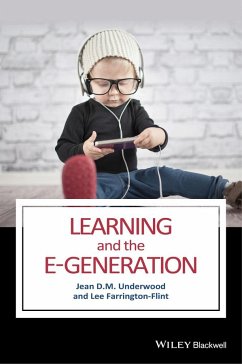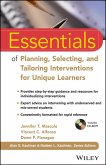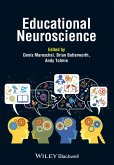- Broschiertes Buch
- Merkliste
- Auf die Merkliste
- Bewerten Bewerten
- Teilen
- Produkt teilen
- Produkterinnerung
- Produkterinnerung
This book examines the impact of digital technologies onlearners in formal and informal settings. Written by twoexperts, it draws on the latest research from psychology,neuroscience, and education. The chapters cover e-readers andtablets as teaching tools, digital literacy, social networking ineducational contexts, and more.
Learning and the E-Generation examines the impact of newand emerging digital technologies-from computers and tabletsto social media and video games-on learners in formal andinformal settings.
Assesses the psychological factors at play, including social,cognitive,…mehr
Andere Kunden interessierten sich auch für
![Essentials of Planning, Selecting, and Tailoring Interventions for Unique Learners Essentials of Planning, Selecting, and Tailoring Interventions for Unique Learners]() Jennifer T. MascoloEssentials of Planning, Selecting, and Tailoring Interventions for Unique Learners50,99 €
Jennifer T. MascoloEssentials of Planning, Selecting, and Tailoring Interventions for Unique Learners50,99 €![Writing Useful, Accessible, and Legally Defensible Psychoeducational Reports Writing Useful, Accessible, and Legally Defensible Psychoeducational Reports]() Michael HassWriting Useful, Accessible, and Legally Defensible Psychoeducational Reports37,99 €
Michael HassWriting Useful, Accessible, and Legally Defensible Psychoeducational Reports37,99 €![Meeting the Psychoeducational Needs of Minority Students Meeting the Psychoeducational Needs of Minority Students]() Craig L. FrisbyMeeting the Psychoeducational Needs of Minority Students83,99 €
Craig L. FrisbyMeeting the Psychoeducational Needs of Minority Students83,99 €![G is for Genes P G is for Genes P]() Kathryn AsburyG is for Genes P24,99 €
Kathryn AsburyG is for Genes P24,99 €![Cyberbullying in the Global Playground Cyberbullying in the Global Playground]() Cyberbullying in the Global Playground155,99 €
Cyberbullying in the Global Playground155,99 €![Optimizing Teaching and Learning Optimizing Teaching and Learning]() Regan A. R. GurungOptimizing Teaching and Learning54,99 €
Regan A. R. GurungOptimizing Teaching and Learning54,99 €![Educational Neuroscience Educational Neuroscience]() Educational Neuroscience40,99 €
Educational Neuroscience40,99 €-
-
-
This book examines the impact of digital technologies onlearners in formal and informal settings. Written by twoexperts, it draws on the latest research from psychology,neuroscience, and education. The chapters cover e-readers andtablets as teaching tools, digital literacy, social networking ineducational contexts, and more.
Learning and the E-Generation examines the impact of newand emerging digital technologies-from computers and tabletsto social media and video games-on learners in formal andinformal settings.
Assesses the psychological factors at play, including social,cognitive, and behavioral characteristics that are influenced byexposure to technology
Addresses the risks and benefits of 21 st centurydigital technology on children and young adults
Written by two experts in the field who draw on the latestresearch and practice from psychology, neuroscience, andeducation
Discusses the potential of technology to make the learningprocess more authentic and engaging, as well as the obstacles whichcan prevent this from happening effectively
Learning and the E-Generation examines the impact of newand emerging digital technologies-from computers and tabletsto social media and video games-on learners in formal andinformal settings.
Assesses the psychological factors at play, including social,cognitive, and behavioral characteristics that are influenced byexposure to technology
Addresses the risks and benefits of 21 st centurydigital technology on children and young adults
Written by two experts in the field who draw on the latestresearch and practice from psychology, neuroscience, andeducation
Discusses the potential of technology to make the learningprocess more authentic and engaging, as well as the obstacles whichcan prevent this from happening effectively
Produktdetails
- Produktdetails
- Verlag: Wiley & Sons
- 1. Auflage
- Seitenzahl: 232
- Erscheinungstermin: 9. Februar 2015
- Englisch
- Abmessung: 228mm x 151mm x 15mm
- Gewicht: 304g
- ISBN-13: 9780631208600
- ISBN-10: 0631208607
- Artikelnr.: 22028602
- Verlag: Wiley & Sons
- 1. Auflage
- Seitenzahl: 232
- Erscheinungstermin: 9. Februar 2015
- Englisch
- Abmessung: 228mm x 151mm x 15mm
- Gewicht: 304g
- ISBN-13: 9780631208600
- ISBN-10: 0631208607
- Artikelnr.: 22028602
Jean D. M. Underwood is Professor Emeritus of Psychology at Nottingham Trent University, UK. She has published extensively on the effects of technology identifying the cognitive and social factors that facilitate and inhibit effective learning with and through digital technologies. She is the co-editor of several books, including Learning Through Digital Technologies (2007) and Integrated Learning Systems: Potential into Practice (1997). Lee Farrington-Flint is Lecturer in Developmental Psychology at the Centre for Research in Education & Educational Technology at The Open University, UK. He has published on the topic of early language and literacy skills and early arithmetic development, and the role of digital technology on children's communication and learning. His work has appeared in the Journal of Research in Reading, British Journal of Developmental Psychology , and Educational Psychology, among other top journals.
Foreword ix 1 Learning in a Digital World 1 Starting points 1 Hopes, dreams
and nightmares 4 Why Is the Supportive Evidence so Hard to Find? 5 How does
psychological Theory Illuminate the Educational Debate? 11 How Can We
Bridge the Home School Digital Divide? 15 Risks, skills and opportunities
16 Conclusions 16 2 How do People Learn? 18 Introduction 18 What is
learning? 19 Beyond General Theories of learning 22 What About the Quality
of Learning? 23 Active Versus Passive Learning 24 Preferred Learning Styles
26 What About the Learner? 28 Risks, Skills and opportunities 30
Conclusions 30 3 Social Interactions and Written Communication 32
Introduction 32 Communicating Online 33 Changes in Written Language 36
Abbreviations Mediated Through Technology 39 The Effects of Text
Abbreviations on Literacy Skills 41 Risks, skills and opportunities 44
Conclusions 44 4 E-Books, E-Readers and Tablets, Are they the Way Forward?
46 Introduction 46 E-books: Are they Effective Teaching Tools or an adjunct
to Real Reading Activities? 47 Promoting Collaboration and Peer-group
interactions 51 Adult instruction is Still Important 53 The benefits of
Kindles and iPads 55 Mobile technology and Second Language Learning 58 What
About Those at Risk of Reading Difficulties? 59 A Multisensory Experience
61 Risks, skills and opportunities 64 Conclusions 64 5 Becoming Digitally
Literate 66 Introduction 66 Engaging with New Forms of literacy 67 So Which
Literacy Skills are required to become a Digital Native? 68 The Multimodal
Landscape 70 Visual Literacy and Visual Representations 71 How Can Visual
Representations Support Learning? 73 Risks, skills and opportunities 76
Conclusions 77 6 Social Networking as an Educational Tool 78 Introduction
78 Facebook as a Popular Networking Tool 79 Social Capital 80 Social
Networking in Educational Contexts 82 So why is the Educational use of an
SNS different from Using a Virtual Learning Environment (VLE)? 86 Where
Does This Leave Us? 87 The Need to Establish Rules of the Game: Netiquette
88 Risks, Skills and Opportunities 89 Conclusions 90 7 Absorbed by
Technology 92 Introduction 92 Addiction and Wellbeing 93 Time Wasting 96
Driven by the Fear of Missing Out (FOMO) 97 The Interplay of Cognition and
Internet Activity 98 Are Multitaskers Always at a Disadvantage? 102 Going
with the Flow 103 So what are Young People Learning? 104 Risks, Skills and
Opportunities 105 Conclusions 105 8 Games, Learning and Education 107
Introduction 107 The Nature of Games 108 Simply Addicted to Games? 109
Games and Learning 112 Is Gaming a Panacea for Educational Ills? 116 The
Future of Games for Learning 120 Risks, Skills and Opportunities 122
Conclusions 122 9 Misbehaviour or Merely Misunderstanding? 124 Introduction
124 What is Academic Dishonesty? 125 Prevalence rates of Academic
Malpractice 126 Why do Students Take the Risk? 128 Do they Know what they
are Doing? 130 And the Solution is? 132 Risks, Skills and Opportunities 134
Conclusions 134 10 Being Emotionally Intelligent and Risk Resilient 136
Introduction 136 Shades of Light and Dark 137 Overcoming Risks and Building
Resilience 139 Self-disclosure and Social Networking 142 So are Emotional
Intelligence and Resilience the Key to Reducing Risk? 144 How do We
Cultivate a State of Emotional Intelligence and Risk Resilience? 147 Risks,
Skills and Opportunities 149 Conclusions 150 11 The Future of Learning 151
Introduction 151 The Skills of the Net Generation 152 Bridging the
Home-School Divide 156 Can Psychological Theory Inform Educational
Practice? 158 Promoting Educational Change 160 Learner, Teacher and School
Level Characteristics 161 Many Possibilities but No Certainties 165
References 167 Author Index 202 Subject Index 214
and nightmares 4 Why Is the Supportive Evidence so Hard to Find? 5 How does
psychological Theory Illuminate the Educational Debate? 11 How Can We
Bridge the Home School Digital Divide? 15 Risks, skills and opportunities
16 Conclusions 16 2 How do People Learn? 18 Introduction 18 What is
learning? 19 Beyond General Theories of learning 22 What About the Quality
of Learning? 23 Active Versus Passive Learning 24 Preferred Learning Styles
26 What About the Learner? 28 Risks, Skills and opportunities 30
Conclusions 30 3 Social Interactions and Written Communication 32
Introduction 32 Communicating Online 33 Changes in Written Language 36
Abbreviations Mediated Through Technology 39 The Effects of Text
Abbreviations on Literacy Skills 41 Risks, skills and opportunities 44
Conclusions 44 4 E-Books, E-Readers and Tablets, Are they the Way Forward?
46 Introduction 46 E-books: Are they Effective Teaching Tools or an adjunct
to Real Reading Activities? 47 Promoting Collaboration and Peer-group
interactions 51 Adult instruction is Still Important 53 The benefits of
Kindles and iPads 55 Mobile technology and Second Language Learning 58 What
About Those at Risk of Reading Difficulties? 59 A Multisensory Experience
61 Risks, skills and opportunities 64 Conclusions 64 5 Becoming Digitally
Literate 66 Introduction 66 Engaging with New Forms of literacy 67 So Which
Literacy Skills are required to become a Digital Native? 68 The Multimodal
Landscape 70 Visual Literacy and Visual Representations 71 How Can Visual
Representations Support Learning? 73 Risks, skills and opportunities 76
Conclusions 77 6 Social Networking as an Educational Tool 78 Introduction
78 Facebook as a Popular Networking Tool 79 Social Capital 80 Social
Networking in Educational Contexts 82 So why is the Educational use of an
SNS different from Using a Virtual Learning Environment (VLE)? 86 Where
Does This Leave Us? 87 The Need to Establish Rules of the Game: Netiquette
88 Risks, Skills and Opportunities 89 Conclusions 90 7 Absorbed by
Technology 92 Introduction 92 Addiction and Wellbeing 93 Time Wasting 96
Driven by the Fear of Missing Out (FOMO) 97 The Interplay of Cognition and
Internet Activity 98 Are Multitaskers Always at a Disadvantage? 102 Going
with the Flow 103 So what are Young People Learning? 104 Risks, Skills and
Opportunities 105 Conclusions 105 8 Games, Learning and Education 107
Introduction 107 The Nature of Games 108 Simply Addicted to Games? 109
Games and Learning 112 Is Gaming a Panacea for Educational Ills? 116 The
Future of Games for Learning 120 Risks, Skills and Opportunities 122
Conclusions 122 9 Misbehaviour or Merely Misunderstanding? 124 Introduction
124 What is Academic Dishonesty? 125 Prevalence rates of Academic
Malpractice 126 Why do Students Take the Risk? 128 Do they Know what they
are Doing? 130 And the Solution is? 132 Risks, Skills and Opportunities 134
Conclusions 134 10 Being Emotionally Intelligent and Risk Resilient 136
Introduction 136 Shades of Light and Dark 137 Overcoming Risks and Building
Resilience 139 Self-disclosure and Social Networking 142 So are Emotional
Intelligence and Resilience the Key to Reducing Risk? 144 How do We
Cultivate a State of Emotional Intelligence and Risk Resilience? 147 Risks,
Skills and Opportunities 149 Conclusions 150 11 The Future of Learning 151
Introduction 151 The Skills of the Net Generation 152 Bridging the
Home-School Divide 156 Can Psychological Theory Inform Educational
Practice? 158 Promoting Educational Change 160 Learner, Teacher and School
Level Characteristics 161 Many Possibilities but No Certainties 165
References 167 Author Index 202 Subject Index 214
Foreword ix 1 Learning in a Digital World 1 Starting points 1 Hopes, dreams
and nightmares 4 Why Is the Supportive Evidence so Hard to Find? 5 How does
psychological Theory Illuminate the Educational Debate? 11 How Can We
Bridge the Home School Digital Divide? 15 Risks, skills and opportunities
16 Conclusions 16 2 How do People Learn? 18 Introduction 18 What is
learning? 19 Beyond General Theories of learning 22 What About the Quality
of Learning? 23 Active Versus Passive Learning 24 Preferred Learning Styles
26 What About the Learner? 28 Risks, Skills and opportunities 30
Conclusions 30 3 Social Interactions and Written Communication 32
Introduction 32 Communicating Online 33 Changes in Written Language 36
Abbreviations Mediated Through Technology 39 The Effects of Text
Abbreviations on Literacy Skills 41 Risks, skills and opportunities 44
Conclusions 44 4 E-Books, E-Readers and Tablets, Are they the Way Forward?
46 Introduction 46 E-books: Are they Effective Teaching Tools or an adjunct
to Real Reading Activities? 47 Promoting Collaboration and Peer-group
interactions 51 Adult instruction is Still Important 53 The benefits of
Kindles and iPads 55 Mobile technology and Second Language Learning 58 What
About Those at Risk of Reading Difficulties? 59 A Multisensory Experience
61 Risks, skills and opportunities 64 Conclusions 64 5 Becoming Digitally
Literate 66 Introduction 66 Engaging with New Forms of literacy 67 So Which
Literacy Skills are required to become a Digital Native? 68 The Multimodal
Landscape 70 Visual Literacy and Visual Representations 71 How Can Visual
Representations Support Learning? 73 Risks, skills and opportunities 76
Conclusions 77 6 Social Networking as an Educational Tool 78 Introduction
78 Facebook as a Popular Networking Tool 79 Social Capital 80 Social
Networking in Educational Contexts 82 So why is the Educational use of an
SNS different from Using a Virtual Learning Environment (VLE)? 86 Where
Does This Leave Us? 87 The Need to Establish Rules of the Game: Netiquette
88 Risks, Skills and Opportunities 89 Conclusions 90 7 Absorbed by
Technology 92 Introduction 92 Addiction and Wellbeing 93 Time Wasting 96
Driven by the Fear of Missing Out (FOMO) 97 The Interplay of Cognition and
Internet Activity 98 Are Multitaskers Always at a Disadvantage? 102 Going
with the Flow 103 So what are Young People Learning? 104 Risks, Skills and
Opportunities 105 Conclusions 105 8 Games, Learning and Education 107
Introduction 107 The Nature of Games 108 Simply Addicted to Games? 109
Games and Learning 112 Is Gaming a Panacea for Educational Ills? 116 The
Future of Games for Learning 120 Risks, Skills and Opportunities 122
Conclusions 122 9 Misbehaviour or Merely Misunderstanding? 124 Introduction
124 What is Academic Dishonesty? 125 Prevalence rates of Academic
Malpractice 126 Why do Students Take the Risk? 128 Do they Know what they
are Doing? 130 And the Solution is? 132 Risks, Skills and Opportunities 134
Conclusions 134 10 Being Emotionally Intelligent and Risk Resilient 136
Introduction 136 Shades of Light and Dark 137 Overcoming Risks and Building
Resilience 139 Self-disclosure and Social Networking 142 So are Emotional
Intelligence and Resilience the Key to Reducing Risk? 144 How do We
Cultivate a State of Emotional Intelligence and Risk Resilience? 147 Risks,
Skills and Opportunities 149 Conclusions 150 11 The Future of Learning 151
Introduction 151 The Skills of the Net Generation 152 Bridging the
Home-School Divide 156 Can Psychological Theory Inform Educational
Practice? 158 Promoting Educational Change 160 Learner, Teacher and School
Level Characteristics 161 Many Possibilities but No Certainties 165
References 167 Author Index 202 Subject Index 214
and nightmares 4 Why Is the Supportive Evidence so Hard to Find? 5 How does
psychological Theory Illuminate the Educational Debate? 11 How Can We
Bridge the Home School Digital Divide? 15 Risks, skills and opportunities
16 Conclusions 16 2 How do People Learn? 18 Introduction 18 What is
learning? 19 Beyond General Theories of learning 22 What About the Quality
of Learning? 23 Active Versus Passive Learning 24 Preferred Learning Styles
26 What About the Learner? 28 Risks, Skills and opportunities 30
Conclusions 30 3 Social Interactions and Written Communication 32
Introduction 32 Communicating Online 33 Changes in Written Language 36
Abbreviations Mediated Through Technology 39 The Effects of Text
Abbreviations on Literacy Skills 41 Risks, skills and opportunities 44
Conclusions 44 4 E-Books, E-Readers and Tablets, Are they the Way Forward?
46 Introduction 46 E-books: Are they Effective Teaching Tools or an adjunct
to Real Reading Activities? 47 Promoting Collaboration and Peer-group
interactions 51 Adult instruction is Still Important 53 The benefits of
Kindles and iPads 55 Mobile technology and Second Language Learning 58 What
About Those at Risk of Reading Difficulties? 59 A Multisensory Experience
61 Risks, skills and opportunities 64 Conclusions 64 5 Becoming Digitally
Literate 66 Introduction 66 Engaging with New Forms of literacy 67 So Which
Literacy Skills are required to become a Digital Native? 68 The Multimodal
Landscape 70 Visual Literacy and Visual Representations 71 How Can Visual
Representations Support Learning? 73 Risks, skills and opportunities 76
Conclusions 77 6 Social Networking as an Educational Tool 78 Introduction
78 Facebook as a Popular Networking Tool 79 Social Capital 80 Social
Networking in Educational Contexts 82 So why is the Educational use of an
SNS different from Using a Virtual Learning Environment (VLE)? 86 Where
Does This Leave Us? 87 The Need to Establish Rules of the Game: Netiquette
88 Risks, Skills and Opportunities 89 Conclusions 90 7 Absorbed by
Technology 92 Introduction 92 Addiction and Wellbeing 93 Time Wasting 96
Driven by the Fear of Missing Out (FOMO) 97 The Interplay of Cognition and
Internet Activity 98 Are Multitaskers Always at a Disadvantage? 102 Going
with the Flow 103 So what are Young People Learning? 104 Risks, Skills and
Opportunities 105 Conclusions 105 8 Games, Learning and Education 107
Introduction 107 The Nature of Games 108 Simply Addicted to Games? 109
Games and Learning 112 Is Gaming a Panacea for Educational Ills? 116 The
Future of Games for Learning 120 Risks, Skills and Opportunities 122
Conclusions 122 9 Misbehaviour or Merely Misunderstanding? 124 Introduction
124 What is Academic Dishonesty? 125 Prevalence rates of Academic
Malpractice 126 Why do Students Take the Risk? 128 Do they Know what they
are Doing? 130 And the Solution is? 132 Risks, Skills and Opportunities 134
Conclusions 134 10 Being Emotionally Intelligent and Risk Resilient 136
Introduction 136 Shades of Light and Dark 137 Overcoming Risks and Building
Resilience 139 Self-disclosure and Social Networking 142 So are Emotional
Intelligence and Resilience the Key to Reducing Risk? 144 How do We
Cultivate a State of Emotional Intelligence and Risk Resilience? 147 Risks,
Skills and Opportunities 149 Conclusions 150 11 The Future of Learning 151
Introduction 151 The Skills of the Net Generation 152 Bridging the
Home-School Divide 156 Can Psychological Theory Inform Educational
Practice? 158 Promoting Educational Change 160 Learner, Teacher and School
Level Characteristics 161 Many Possibilities but No Certainties 165
References 167 Author Index 202 Subject Index 214








